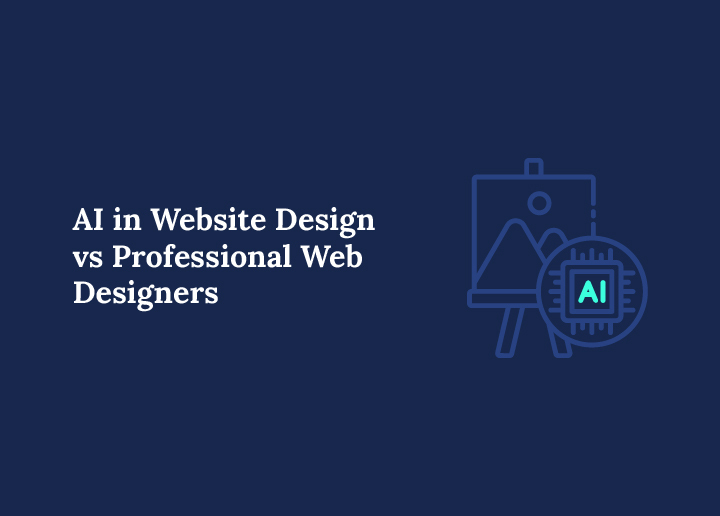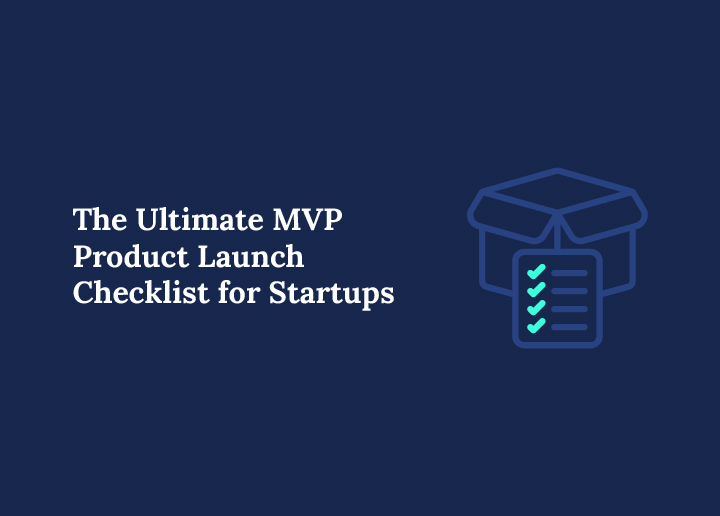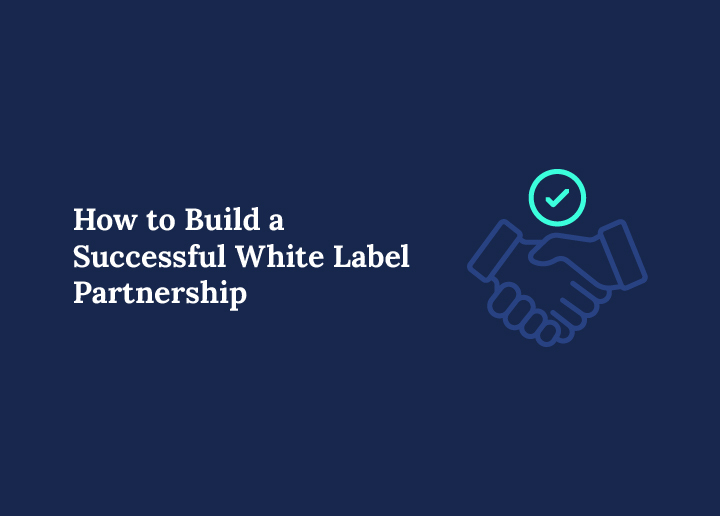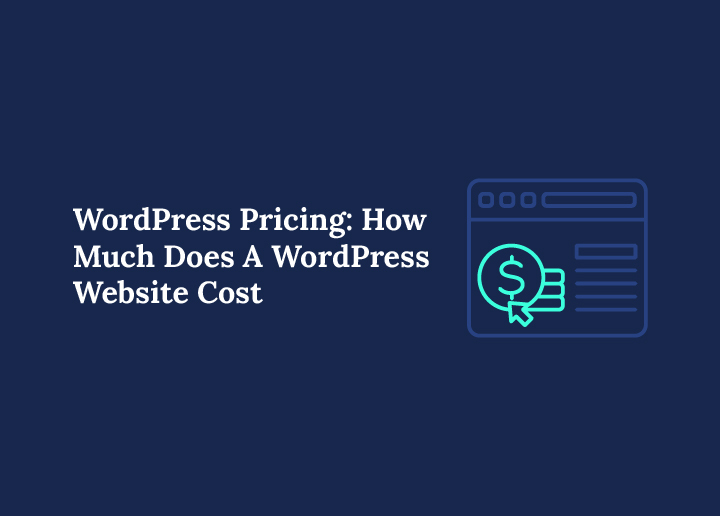The debate around AI in website design vs professional web designers is growing as technology rapidly transforms how websites are built.
With the rise of AI-powered tools and AI website builders, even those without coding knowledge can now create professional-looking websites quickly and affordably. These platforms use machine learning and pre-existing templates to streamline the website creation process, making them appealing for everything from e-commerce to personal blogs.
Still, human web designers bring something AI can’t replicate, human insight, emotional understanding, and the ability to align a website with your business goals, brand strategy, and target audience.
In this blog, we’ll compare the strengths and limitations of AI technology and human expertise, helping you choose the right path for your next web development project.
Understanding AI in Website Design
AI web design refers to the use of artificial intelligence to automate parts, or even the entirety, of the website creation process. These tools use machine learning algorithms to analyze user input, industry standards, and design best practices to generate fully functional websites. It’s a powerful evolution in the web design industry, making website creation more accessible and faster than ever.
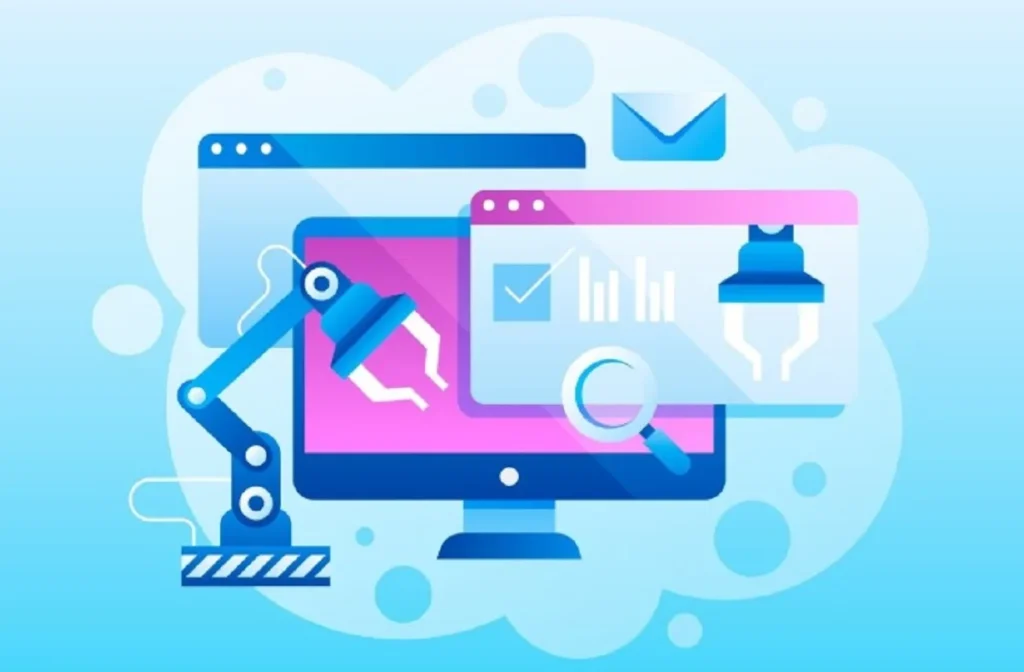
Examples of AI-powered website builders
Some of the most popular AI website builders include:
- Wix ADI: Offers automated website design based on a few simple questions.
- Bookmark with AIDA: Uses AI to instantly generate a site tailored to your business niche.
- Framer AI: A newer AI builder offering cutting-edge tools that combine ease of use with design flexibility.
These platforms eliminate the need for coding knowledge or technical expertise, making them ideal for individuals, startups, and small businesses looking to get online fast.
Key features of AI web design
- Automated layouts tailored to your industry or goals
- AI-generated content for headings, descriptions, and more
- Image selection from royalty-free sources or based on brand keywords
- Responsive design optimized for mobile users
- Integration with content management systems like CMS Lite or similar
- Basic SEO features to help improve search engine visibility
Role of Professional Web Designers
Professional web designers are skilled creatives and developers who offer bespoke solutions aligned with your brand, goals, and audience.
Whether working independently or through a professional agency, they combine graphic design, user behavior analysis, and technical aspects of web development to deliver a tailored digital experience.
Unlike automated solutions, human web designers bring a human touch, big-picture thinking, and specialist knowledge to every project.
Focus areas of a professional web designer
- UI/UX design: Creating intuitive, user-centric designs that enhance user engagement
- Custom functionality: From booking systems to advanced eCommerce logic, tailored to business needs
- Brand identity: Aligning visuals and interactions with the company’s brand strategy
- SEO and speed optimization: Ensuring your website is fast and discoverable on search engines
The traditional web design process is highly collaborative. It typically involves:
- Strategy meetings and discovery sessions
- Wireframes and design prototypes
- Iterative feedback loops
- Frontend and backend development
- QA testing, deployment, and ongoing maintenance
This creation process ensures the final website reflects your brand, serves your users, and meets your business objectives.
Need a Website That Stands Out and Delivers Results?
Skip the guesswork, work with our professional web designers to create a custom, high-converting website tailored to your brand.
Side-by-Side Comparison: AI vs Web Designers
To better understand the differences between AI in website design vs professional web designers, let’s look at how each performs across key areas. While AI offers speed and convenience, human designers bring creativity, strategy, and a personal touch to the website design process.
| Feature | AI Website Design | Professional Designers |
|---|---|---|
| Speed | AI-generated websites are built almost instantly, often in minutes, making them ideal for rapid deployment. | Custom sites take longer as they involve planning, collaboration, and iteration to ensure quality and brand alignment. |
| Cost | Typically very low or even completely free, making it a budget-friendly option for basic sites. | Costs vary depending on complexity but are generally higher due to human labor and tailored work. |
| Customization | Offers limited personalization, relying heavily on templates and automated choices. | Allows full customization, from layout to interactive features, aligned with business goals and brand strategy. |
| Creativity | Designs are template-driven with minimal human insight, resulting in generic appearances. | Human-driven innovation results in unique, engaging designs informed by storytelling and strategy. |
| Flexibility | Often rigid in structure; difficult to scale or deeply modify beyond initial setup. | Highly adaptable, with room for custom features, integrations, and evolving user needs. |
| Support | Mostly automated, using chatbots or AI help centers with limited problem-solving scope. | Involves real-time communication with professionals who offer advice, revisions, and long-term support. |
AI in Web Design vs. Professional Web Designers
Here’s a detailed comparison between AI in website design vs professional web designers:

Design Quality & Originality
AI platforms like Wix ADI and Framer AI rely heavily on pre-designed templates, layout algorithms, and data-driven logic. While the output looks polished and clean, it often lacks originality and the nuanced storytelling that reflects a brand’s identity.
These AI-generated solutions are great for fast deployment, but tend to produce websites that feel generic, especially when many businesses use the same visual components and structure.
On the other hand, professional web design involves human creativity. A web developer or designer works with you to deeply understand your brand voice, goals, audience behavior, and tone.
This allows them to craft a visually compelling and unique web presence that goes beyond surface-level aesthetics. By integrating elements like brand storytelling, emotional appeal, and custom features, human developers create designs that resonate and build trust.
Verdict: If standing out in a competitive market is your goal, especially in eCommerce or service industries, traditional professional web design provides the originality that AI capabilities simply can’t replicate, yet.
Speed and Turnaround
Artificial intelligence (AI) shines in speed. Tools like Wix ADI or Bookmark can produce a live website in minutes by pulling in industry-specific content and applying ready-to-use themes. This makes building websites faster than ever before, ideal for startups or freelancers in need of a quick portfolio or landing page.
Conversely, a professional web designer follows a more in-depth process: discovery, wireframing, prototyping, feedback rounds, and final implementation. This timeline could range from several days to weeks, especially for complex eCommerce sites or corporate platforms.
Verdict: For rapid prototyping or temporary solutions, AI platforms are unmatched. But for a long-term, strategic digital asset, the slower pace of a human developer ensures a more thoughtful, tailored result.
Cost
One of the biggest draws of AI-generated solutions is affordability. Most AI website builders offer freemium models or low-cost subscriptions, making them ideal for businesses with tight budgets. You don’t pay for custom design work, and automated systems reduce the need for hiring developers.
However, professional web design requires a larger initial investment. Costs can vary depending on scope, but the value lies in getting a website optimized for conversion, usability, and long-term business goals.
Verdict: AI capabilities provide a cost-effective route for basic sites, while human developers offer better ROI over time for those seeking business growth through effective content creation and user engagement.
Flexibility & Scalability
AI web builders typically come with limitations. You’re often bound by a fixed grid system or templated layout, which can make it hard to implement advanced features or adapt as your business evolves. Adding custom functionality, like complex forms or third-party integrations, is limited and sometimes impossible without switching to a different platform.
By contrast, professional web design offers full scalability. Developers can write custom code, integrate APIs, implement cutting-edge technology, and build out entirely new features tailored to your goals.
Whether you’re starting a blog or launching a robust eCommerce site, professional help ensures your website evolves with your brand and industry trends.
Verdict: For businesses that plan to scale or need more than just a digital brochure, traditional website builders powered by AI fall short. You’ll need the flexibility and adaptability that only a human developer can provide.
SEO and Performance
Most AI web builders come with standard SEO features: responsive layouts, editable title tags, and meta descriptions. These are good for basic optimization. However, they don’t account for deeper SEO practices like structured data (schema markup), Core Web Vitals, or image optimization for performance.
Professional web design teams, on the other hand, prioritize both user experience (UX) and technical SEO. They ensure your website is up to date with the latest Google guidelines, accessibility standards, and performance metrics. This is crucial for e-commerce and competitive industries where rankings matter.
Verdict: For serious SEO and long-term traffic growth, AI can’t replace the strategic insight of a web developer or SEO specialist.
Support and Maintenance
AI platforms usually provide limited support, mostly in the form of FAQs, chatbots, or forums. While this works for straightforward setups, it often falls short when technical issues arise or custom changes are needed.
Professional web designers offer ongoing human interaction, real-time support, bug fixes, performance monitoring, and even help with content creation. As trends shift or your business goals change, you can count on your team to update and evolve the site accordingly.
Verdict: AI offers basic assistance, but only human experts can provide a reliable partnership and personalized maintenance.
Creativity and Strategic Thinking
Finally, the biggest differentiator lies in human emotion and strategy. AI uses logic, predictive modeling, and historical data to generate designs, but it lacks empathy, intuition, and storytelling. It can’t think critically about how users interact with different elements or how to evoke a certain emotional response.
Professional designers use design thinking, business acumen, and creativity to build sites that connect with users. They don’t just make a website functional, they make it memorable.
Verdict: When it comes to human-centered design, emotional resonance, and conversion-focused strategy, human creativity still leads by a wide margin.
Read: Website Design Guide for Professional Web Designers
When AI is a Good Fit
AI-powered web design tools are an excellent choice for startups, personal brands, and small businesses that need a quick online presence without a hefty price tag. These platforms, like Wix ADI and other DIY website builders, offer beginner-friendly tools that simplify the website creation process.
You can choose from pre-existing templates, customize content, and get a decent-looking site live in minutes, no coding knowledge required. AI-generated solutions are especially useful when time and budget are constraints, such as during early-stage launches or for portfolio and brochure-style websites.
Thanks to affordable website design models and intuitive dashboards, these tools help you build a functional website without technical expertise.
While they may not allow for deep customization or rich interactivity, they’re ideal for simple informational websites, event pages, or small e-commerce sites that don’t require extensive integration.
If you’re comfortable working within a structured interface and don’t mind limited user-centric design, AI platforms can be a practical option.
When to Choose a Professional Web Designer
When your business goals extend beyond a basic web presence, a professional web designer becomes essential.
Human designers offer not just design skills, but also specialist knowledge in custom website development, user behavior, accessibility, and conversion-focused strategy. This is especially crucial for e-commerce sites, SaaS platforms, and growing brands that demand a custom UI/UX experience tailored to their audience.
A professional web design team brings human creativity, brand storytelling, and emotional design into the website creation process, elements that AI still struggles to replicate.
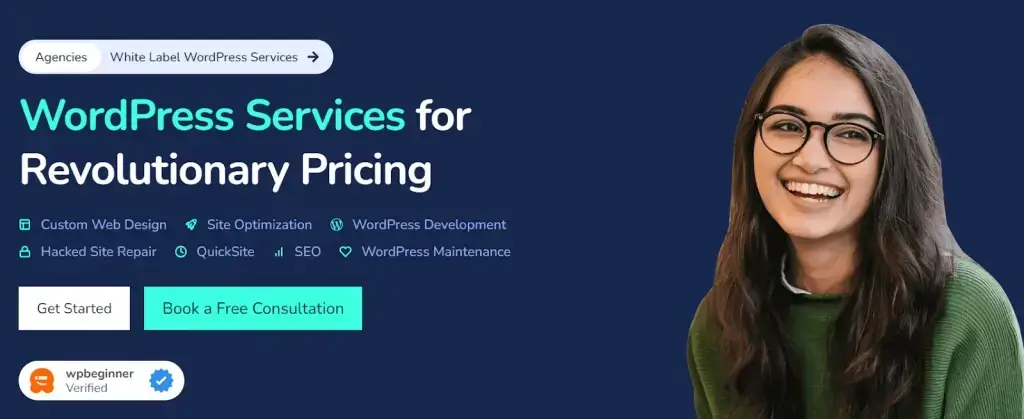
Human insight allows for adaptable, responsive, and up-to-date designs that evolve with your business. For brands that want to stand out and make a lasting impact, tailored website solutions are worth the investment.
A professional can craft a site that reflects your identity and supports your business goals while offering superior search engine visibility and user engagement.
Hybrid Approaches: Best of Both Worlds
When comparing AI in website design vs professional web designers, many modern web projects are embracing hybrid web design strategies that combine the efficiency of AI with the expertise of human designers.
For instance, AI can be used in the early stages for rapid wireframing, content creation, or layout suggestions. Designers can then refine these AI-generated outputs to align with brand guidelines, business objectives, and user expectations. This not only saves time but enhances productivity.
Designers themselves are also incorporating AI-assisted web design into their workflow. Tools like Figma AI or Adobe Firefly help automate repetitive tasks such as resizing assets or suggesting copy, allowing the designer to focus more on creative direction and user-centric design.
By leveraging AI’s speed and scalability with human strategic thinking, businesses can achieve cutting-edge technology outcomes without compromising on quality.
This collaborative workflow empowers agencies and freelance designers alike to deliver fast, affordable, and professional-looking websites.
Whether you’re a business owner using AI for initial drafts or a human developer streamlining their workflow with machine learning, the blend of automation and human emotion offers a flexible path to high-impact design.
Explore: How to Create AI Images for a WordPress Website
Final Verdict: Which is Better?
When it comes to the debate of AI in website design vs professional web designers, there is no clear winner. The best choice depends entirely on your unique goals, budget, timeline, and the complexity of your project. For businesses with a vision rooted in brand storytelling, strategic user experience, and long-term growth, professional web designers offer the expertise, creativity, and personalized solutions necessary to bring that vision to life.
On the other hand, early-stage startups, solopreneurs, or DIYers with limited budgets may find immense value in the speed and simplicity of AI-powered platforms. These tools allow for quick setup and immediate online presence with little to no design experience. While the output may not be highly original, it gets the job done effectively for basic needs.
Ultimately, choosing the right solution is less about picking a side and more about understanding your project’s priorities. If you need scalability, originality, and refined website design strategy, investing in human talent is worthwhile. But if you’re looking to get online quickly with minimal fuss, AI offers a compelling alternative.
Conclusion
Both AI and professional designers bring unique strengths to the table. AI website builders excel in automation, affordability, and speed, making them great for basic projects or tight timelines. However, they often lack the creative depth, flexibility, and strategic thinking that a professional designer provides. Human designers craft custom, intuitive, and emotionally resonant websites that reflect your brand and connect with your audience on a deeper level.
So when weighing the pros and cons of AI vs professional designers, focus on what your business truly needs. Consider factors like your budget, desired timeline, and the role your website plays in your overall business strategy.
Whether you’re leaning toward an AI website builder for a quick launch or looking for a professional web design service to elevate your digital presence, taking that first step is key. Explore expert design services or test an AI tool today to begin building a website that works for you.
